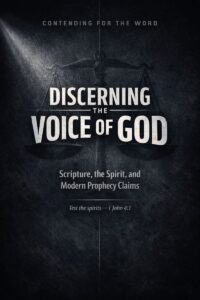⏱️ Estimated Reading Time: 4 min read
Scripture and Women Pastors: Why It Matters Today
What does the Bible say about women pastors? That’s a question many believers—young and old—are asking in today’s cultural moment. In a world increasingly focused on equality and empowerment, it’s understandable that this issue would provoke deep thought and even disagreement. But as always, our final authority is not cultural sentiment, but the Word of God.
God’s Design for Church Leadership
At the heart of this conversation is the nature of the pastoral office. In the New Testament, the terms pastor, elder, and overseer are used interchangeably (cf. Acts 20:28; 1 Peter 5:1–3) to describe those entrusted with the spiritual oversight, doctrinal instruction, and governance of the local church.
Scripture teaches that this office is to be held by qualified men—not because men are more valuable, gifted, or intelligent, but because of God’s wise and intentional design. This is not a restriction based on culture but on creation.
Key Passages That Speak Clearly
1 Timothy 2:12–14
“I do not permit a woman to teach or to exercise authority over a man; rather, she is to remain quiet. For Adam was formed first, then Eve.”
Paul’s instruction here is not based on cultural norms but on the created order. He points back to Genesis to ground his teaching in God’s original design. In the context of the gathered church, Paul limits authoritative teaching and governing roles to men.
1 Timothy 3:1–7
The very next chapter lists the qualifications for elders:
“If anyone aspires to the office of overseer, he desires a noble task. Therefore, an overseer must be above reproach, the husband of one wife…”
The language is consistently masculine, emphasizing leadership in both the home and the church.
Titus 1:5–9
This parallel passage reiterates the same pattern: elders must be faithful male leaders, able to instruct in sound doctrine and refute those who contradict it.
1 Corinthians 14:33–35
“As in all the churches of the saints, the women should keep silent in the churches…”
Paul is not saying that women can never speak in church—after all, he affirms women praying in 1 Corinthians 11. Rather, this refers to the authoritative evaluation and judgment, which was a function of the elders.
Doesn’t This Devalue Women?
Not at all. Scripture never teaches that men are more important, more spiritual, or more capable than women. On the contrary, men and women are equal in worth, dignity, and salvation (Genesis 1:27; Galatians 3:28).
What Scripture teaches is not inequality—but distinction. God has created men and women with complementary roles that reflect His character and design. Just as Christ lovingly leads the Church, and the Church joyfully submits to Christ, so biblical leadership in the church models that same beautiful order (Ephesians 5:22–33).
A woman is not disqualified from leadership because she lacks gifting—many women are exceptional teachers, counselors, and leaders. Rather, the pastoral office is restricted because God, in His wisdom, has assigned different responsibilities to men and women for the flourishing of His people.
What About Common Objections?
“Wasn’t this just Paul’s cultural context?”
No. Paul grounds his teaching in creation, not culture (1 Timothy 2:13–14). This transcends time and setting.
“Didn’t Deborah lead Israel?”
Yes, Deborah was a prophetess and judge in the Old Testament. But she served in a civil role, not a church office. Her leadership came during a time of male failure (Judges 4–5). Her example is descriptive—not prescriptive.
“What about Galatians 3:28?”
That passage teaches that men and women are equal in Christ—not that they have identical roles in the church. It speaks of salvation, not ecclesiology.
What Should Churches Do?
- Honor and equip women to teach and disciple other women (Titus 2:3–5), lead ministries, and serve in many areas of church life.
- Uphold biblical qualifications for elders and pastors as laid out in 1 Timothy 3 and Titus 1.
- Encourage men to rise up in humble, sacrificial leadership in their homes and churches.
“Let all things be done decently and in order.” – 1 Corinthians 14:40
Conclusion: Clarity, Conviction, and Compassion
This issue is not merely academic—it’s pastoral. How we handle God’s Word shapes our discipleship, our leadership, and our witness to a watching world.
In an age of confusion, the church needs conviction. In an age of compromise, it needs courage. And in all things, it must walk in love—holding fast to God’s design and calling both men and women to flourish in their respective roles.
Let us trust that God’s way is not only true—it is good.
For Further Study
Dave Jenkins is happily married to his wife, Sarah. He is a writer, editor, and speaker living in beautiful Southern Oregon. Dave is a lover of Christ, His people, the Church, and sound theology. He serves as the Executive Director of Servants of Grace Ministries, the Executive Editor of Theology for Life Magazine, the Host and Producer of Equipping You in Grace Podcast, and is a contributor to and producer of Contending for the Word. He is the author of The Word Explored: The Problem of Biblical Illiteracy and What To Do About It (House to House, 2021), The Word Matters: Defending Biblical Authority Against the Spirit of the Age (G3 Press, 2022), and Contentment: The Journey of a Lifetime (Theology for Life, 2024). You can find him on Facebook, Twitter, Instagram, Youtube, or read his newsletter. Dave loves to spend time with his wife, going to movies, eating at a nice restaurant, or going out for a round of golf with a good friend. He is also a voracious reader, in particular of Reformed theology, and the Puritans. You will often find him when he’s not busy with ministry reading a pile of the latest books from a wide variety of Christian publishers. Dave received his M.A.R. and M.Div through Liberty Baptist Theological Seminary.




